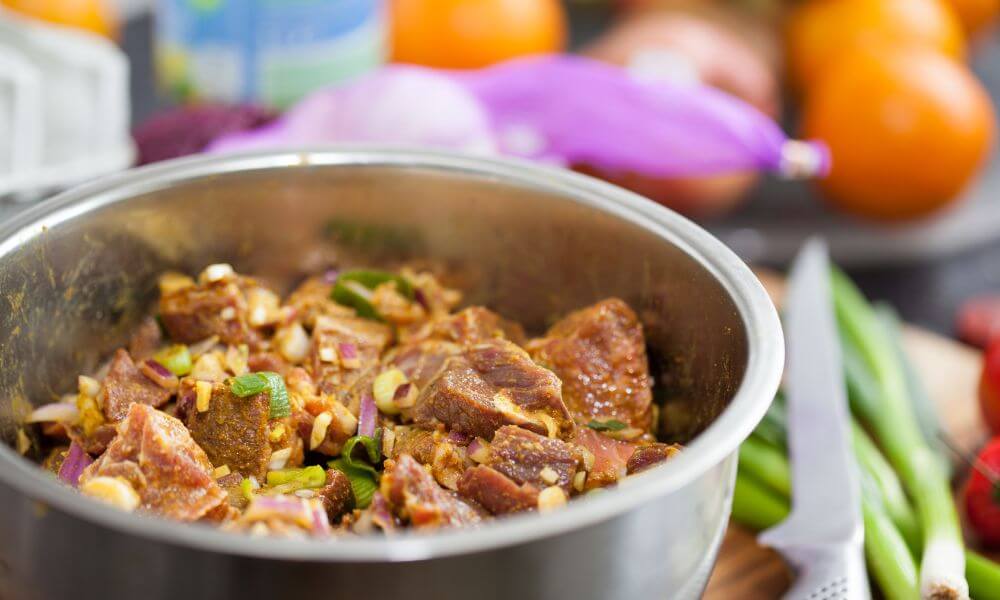It is the case in a few parts of Asia that there is either no distinction between goat and sheep when referring to mutton, or that mutton specifically refers to goat meat.
This is true in much of the Indian subcontinent, too.
Let’s look further into this.

What do Indians call goats?
This is a bit of a complex question, so let’s just first clear up what we mean.
It’s not my intention to give you a rundown of the equivalent word for goat in every one of the 121 languages spoken across the subcontinent.
In much of India, English is still in common use as a second or even sometimes a first language.
For all of those people, a goat is simply a goat—they don’t have other words for the live animal.
Of course, again, there will be many different words for goat in the languages of India—in Hindi, Bengali, Gujurati.
But in the English-speaking areas, goat is still the one and only word for a goat.
Other than nicknames used equally in other parts of the world, that is—such as billy, or doe.
So, what about the meat itself, then?
This is where things diverge.
What do Indians call goat meat?
More or less universally across the English-speaking regions of India, goat meat is referred to as mutton.
As a native English speaker from the West, particularly the U.K. or North America, this will likely surprise you since mutton is typically the name for sheep meat.
Of course, this is indeed true.
We use the term mutton for the meat of a mature sheep.
It’s not a particularly common food to eat, but the terminology is still universally agreed on.
In some parts of India, mutton may specifically refer to goat, to the exclusion of sheep.
In rarer cases, it may also work the other way around.
Most of the time, though, the term mutton is an umbrella term for both goat and sheep meat.
The two meats, culinarily, are quite similar, and so they can be used interchangeably.
It is also just a way of defining them within broad categories, in the same way we might with red and white meat.
Mutton is almost like a type of meat.
Why, then, is goat meat in India called mutton, where in the West this term refers only to sheep?
Why is Indian goat meat called mutton?
I do just want to add the quick caveat, that I briefly touched on, that what I’m saying isn’t universally true.
India is a very large place, and you’ll find vastly different linguistic habits in use across different regions.
Goat meat isn’t always called mutton.
That said, the term mutton derives from the Old French mouton, which meant the meat of an adult sheep.
India still has a huge English-speaking population because they were under the commonwealth of the British Empire until the 1940s.
Mutton came to be a term that encompassed, essentially, cheap and readily available meats.
Goat and sheep are among the most common livestock in the world, and in India certainly.
Goat meat and sheep meat were lumped together simply as being abundant in an area so economically deprived.
There is no simple answer to this question, though, and like I said, lots of areas where mutton does specifically mean sheep.
Does sheep meat have any other names, then?
What is sheep meat called in India?
For the most part, anything you hear referred to as mutton has a stronger chance of being sheep than being goat.
The meat of a juvenile sheep, of course, is always lamb—mutton and lamb are very different.
Sheep meat has no other specific name, and nothing which distinguishes mutton from sheep meat.
Sheep meat is always mutton—it may, also, be goat meat.
So, there may be some areas where mutton refers to both goat and sheep, but it will very rarely refer only to goats.
The thing to remember when answering this question is that India is a pretty enormous place.
It’s a vast swathe of land, encompassing well over a billion people and countless languages.
It is far from a monoculture, and certainly not a monoglot country.
How goat meat is referred to is going to vary a lot between areas and people.
For the English-speaking parts, though, goat meat is overwhelmingly referred to as mutton.
